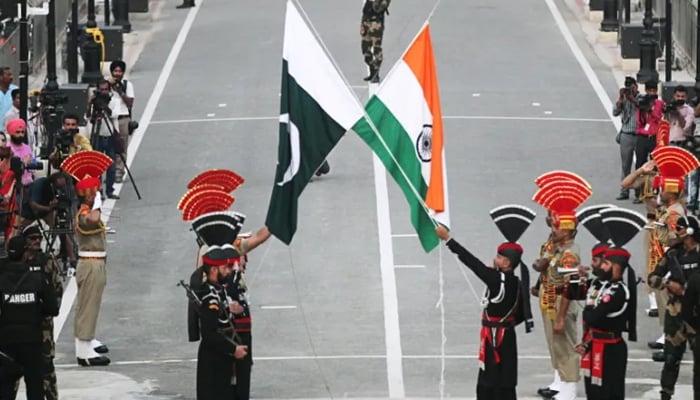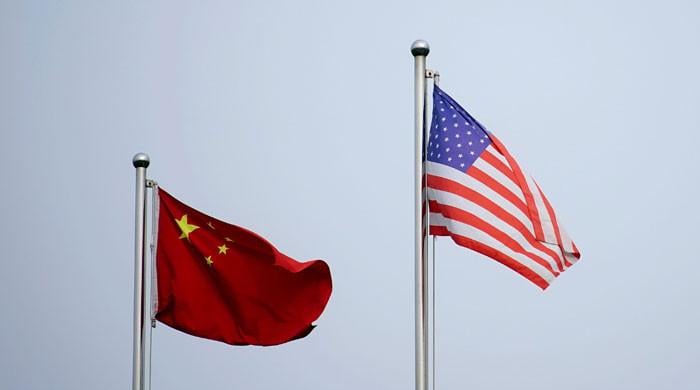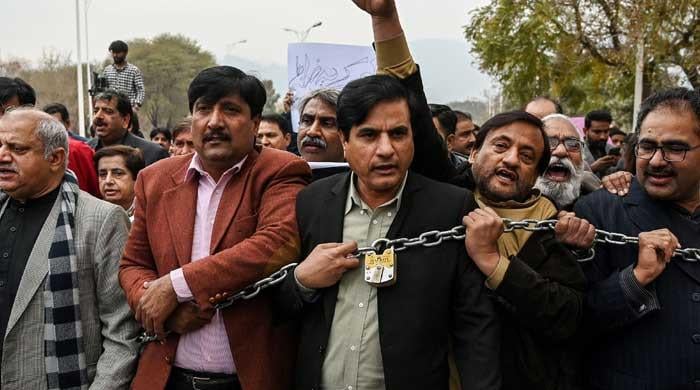Restore ties with India?
Abandoning its current policy of near-total disengagement presents Pakistan with challenging yet essential realities
July 08, 2024

With the Bharatiya Janata Party (BJP) securing its third consecutive term in India, Pakistan stands at a pivotal crossroads, necessitating a reassessment of its diplomatic and trade relations with its neighbour.
Abandoning its current policy of near-total disengagement presents Pakistan with challenging yet essential realities.
Here is why Pakistan should prioritise recalibrating its ties with India.
In 2019, Pakistan adopted a policy of almost complete disengagement vis-a-vis India to pressure it into reversing its decision to alter Jammu and Kashmir’s constitutional status.
However, this strategy has not worked at all. Despite Pakistan’s earnest efforts, the global community has continued its interactions with India unabated.
The response from the Arab world has been particularly instructive: the Gulf Cooperation Council (GCC) disregarded the violation of UN resolutions in Kashmir and steadily expanded their trade ties with India.
Weeks after the Indian clampdown on Kashmir, the UAE conferred upon Prime Minister Modi its highest civilian honour, the Order of Zayed, underscoring the burgeoning relations between the two sides.
Today, the UAE stands as the fourth-largest foreign investor in India. Saudi Arabia also plans to invest $100 billion in India in the coming years, including $50 billion in a mega refinery project involving Saudi Aramco, Abu Dhabi National Oil Company (ADNOC), and Indian firms.
The US and the EU have also maintained robust engagement with India. Despite Pakistan’s vehement protests, they, along with other nations, even participated in a G20 meeting on tourism in Srinagar in May 2023, reinforcing India’s control in the region.
This unequivocally indicates that Pakistan’s disengagement policy with India has not yielded the desired objectives, necessitating the adoption of a more pragmatic, forward-thinking approach.
Recent years have also underscored the necessity for Pakistan to disentangle trade from politics, a balance successfully achieved by other nations despite geopolitical tensions.
China, for instance, continues substantial trade with Taiwan, with 42% of Taiwan’s exports going to China. Similarly, despite military tensions, India and China’s bilateral trade surpassed $118 billion in 2023 and is set to reach $150 billion soon.
These examples highlight how nations can maintain economic relations despite political disputes, a lesson Pakistan could well take to heart.
It must not be overlooked that, according to the World Bank, potential trade between India and Pakistan could reach $37 billion annually, but it remains untapped. Before the 2019 cutoff, trade between the two countries was $2.4 billion in 2017-18.
Blocking exports worth $1.92 billion can never compel India to alter its Kashmir policy. Thus, re-engaging in trade with India will benefit Pakistan economically and could create a more conducive environment for dialogue.
Pakistan serves as a gateway for India to Afghanistan, Central Asia, Iran, and beyond. As the world’s fifth-largest consumer of primary energy, India requires robust land connections with Central Asia, which is rich in oil and gas.
Projects like the Turkmenistan-Afghanistan-Pakistan-India (TAPI) pipeline, the Iran-Pakistan-India (IPI) pipeline, and the Central Asia-South Asia (CASA-1000) project are vital, with Pakistan as a bridge. While India has sought an alternate route via the Chabahar Port in Iran, it is not a complete solution.
Access to Central Asia depends on peace in Afghanistan, which necessitates Pakistan’s full cooperation. Thus, Pakistan remains the preferred route for India to Central Asia, which it should facilitate for its own geostrategic and economic interests.
Modi now leads a weaker government in India. Anti-Pakistan rhetoric did not serve him well in recent elections, even in his strongholds. Pakistan has an opportunity to reach out to moderate segments in India.
Recent comments by Indian Foreign Minister S Jaishankar, indicating that India will now focus on resolving issues along its borders, suggest that Delhi is open to reopening talks with Islamabad.
Former chief minister of Jammu and Kashmir Farooq Abdullah has also underscored this need, following a string of recent incidents in the region. Pakistan should seize this opportunity.
Lastly, by offering land access, Pakistan can incentivise India to undertake confidence-building measures in Jammu and Kashmir, such as restoring Article 35A, releasing political prisoners, and resuming cross-Line of Control (LoC) trade and the composite dialogue process stalled since 2015.
The future of the ongoing phase of the freedom struggle in Kashmir hinges on securing maximum relief and political space for its besieged people, which under the present circumstances is not possible except through talks and negotiations.
Due to various reasons and strategic blunders, the Kashmir struggle has faced tremendous setbacks in recent years and is likely to backslide further if the prevailing situation persists. Refusing to engage, penetrate, and influence India will only exacerbate the situation.
By promoting dialogue and trade, and leveraging its strategic position, Pakistan can foster regional stability, enhance economic prosperity, and more effectively champion the rights and aspirations of the Kashmiri people.
The path forward requires courage, foresight, and a willingness to depart from entrenched positions in pursuit of a more promising future for both nations.
The writer is an Islamabad-based researcher with a special interest in India, Pakistan and regional affairs. He can be reached at: [email protected]
Disclaimer: The viewpoints expressed in this piece are the writer's own and don't necessarily reflect Geo.tv's editorial policy.
Originally published in The News











